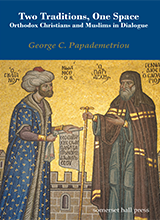George C. Papademetriou – Two Traditions, One Space: Orthodox Christians and Muslims in Dialogue. Reviewed by Minlib Dalih, Loyola University.
(Journal of Ecumenical Studies)
Most monographs on Christian-Muslim dialogue seem unaware of the vast intellectual and cultural contribution of Eastern Christians. Often, the literature focuses on the hardship of Eastern Christians and their perilous demographic decline and misses their historical relevance. In two studies, Bertaina and Papademetriou take steps to remedy this situation by examining the complex and rich history of Eastern Christian and Muslim interfaith tradition. Both books attest that Eastern Christians’ unsung and yet crucial intellectual heritage offers opportunities for a measure of Christian-Muslim rapprochement and a renewal of mutual respect. Also, the books demonstrate that, unlike their counterparts in the West, Oriental Christians have survived and even thrived under Islamic domination since the seventh century. Bertaina and Papademetriou would agree with Mahmoud Ayoub that “Islamic civilization should be properly regarded as Islamic-Eastern Christian Civilization.” With clarity, these books celebrate the religious, cultural, and intellectual achievement of the Arab, Syriac, Greek, and Coptic Christians.
Bertaina bemoans the failure of the current historiography of religious dialogue to account for the continuity between early medieval Christian-Muslim dialogue and contemporary discourse. In his mono- graph, he shows that Eastern Christians who lived from the time of the prophet Muhammad to the Crusades made significant contributions to Christian-Muslim dialogue. Western Christians are impoverished without the knowledge of this intellectual heritage. Further, Bertaina examines the tradition of literary and theological dialogue between Oriental Christians and Muslims from the pre-Islamic period to the eve of the Crusades. First, he explores “a wide range of textual encounters at various points of intersection and sites of conversation”; then he shows “the dynamism of this dialogue and resulting crosspollination.” Very aware of the diversity within and between the two faith traditions, Bertaina surveys twenty primary texts written in Arabic and Syriac from the seventh to the eleventh century. According to the author, dialogue was used for christological debate, divine exegesis, conquest and conversation, competing historiographies, theological education and dialectic, and hagiography and scriptural reinterpretation. Eastern Christians and Muslims articulated their proper identities in tandem and incorporated religious pluralism into their communities. With great expertise, the author introduces modem students and scholars to the extraordinary scholarly tradition of Eastern Christian and Muslim encounters.
Echoing Bertaina's study, Papademetriou draws together a series of papers dedicated to Orthodox Christian and Muslim dialogue. The title, Two Traditions, One Space, captures adequately the spirit and goals of the monograph. It covers, in Part I, “Historical, Philosophical Encounters” and, in Part II, “Contemporary Dialogue.” In the first part, two authors analyze the contribution of two important theologians: John of Damascus and Gregory of Palamas. Other notable themes are “Interreligious Dialogue in Byzantine Thought” and “Contemporary Dialogue between Orthodox Christians and Muslims.” Still germane, comparative topics such as “Jesus as a Prophet of Islam” and “The Jesus Prayer and Dhikr” offer rich theological insights for both faith traditions. Both books include a wealth of information often ignored by Western Christian scholars of interfaith dialogue, and they demonstrate clearly that Christians’ voices were heard when Islam held sway.
Bertaina's book may be difficult at times and often runs against the Western historiography of Christian and Muslim relations. Sometimes his meaning may be elusive because the subject matter is subtle, complex, and profound. Even though Papademetriou book’s pastoral approach is evident, not all of its selections make easy reading. However, with a little perseverance, the reader will gain insight into the extraordinary contribution of Christians who were at home in dar al Islam.
Books Reviewed:
David Bertaina, Christian and Muslim Dialogues: The Religious Uses of a Literary Form in the Early Islamic Middle East. Gorgias Eastern Christian Studies 29. Piscataway, NJ: Gorgias Press, 2011. Pp. 285. Paper.
Two Traditions, One Space: Orthodox Christians and Muslims in Dialogue. Edited by George C. Papademetriou. Boston, MA: Somerset Hall Press, 2011. Pp. 339. Paper.

